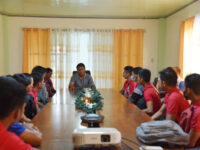President Marcos echoed the declared national policy in PD 269 on total electrification of the Philippines which remains “vital to the welfare of our people and the sound development of the Nation.”
“I remain committed to the pursuit and attainment of this objective in a vigorous and systematic manner, with utmost respect for the concomitant rights of the public service entities engaged in supplying electric service,” the President said in his communication to the legislative bodies.
Though he recognized the legislative measure’s intent to further improve the public’s access to electricity, President Marcos said that he is “constrained to veto the bill due to the susceptibility of the proposed expansion of the franchise area of Davao Light and Power Company, Inc. to legal and/or constitutional challenge due to the apparent overlap and possible infringement into the subsisting franchise, permits, and contracts previously granted to North Davao Electric Cooperative Inc.”
President Marcos also acknowledged the fact that NORDECO’s franchise will only end in 2033. According to the President, House Bill 10554, which aims to kill the EC’s franchise, “runs counter to the provisions of Section 27 of Republic Act No. 9136 or the EPIRA mandating that all existing franchises shall be allowed in its full term.”
“Likewise, the resulting repeal of North Davao Electric Cooperative Inc.’s franchise over the expanded franchise area will violate the non-impairment clause as provided in Section 10, Article III of the 1987 Constitution,” the President added.
The President also emphasized that House Bill 10554 “is a prohibited collateral attach on North Davao Electric Cooperative Inc. franchise” and such bill “is contrary to a jurisprudentially settled doctrine that a franchise cannot be subjected to a ‘collateral attack’”.
During public hearings in the House of Representatives and the Senate, PHILRECA, the association of electric cooperatives operating nationwide, has unequivocally opposed House Bill 10554 due to similar reasons.
“NORDECO was granted a franchise by virtue of Certificates No. 017 and 103 issued by the National Electrification Administration for a period of fifty (50) years from 1978 and 1983, respectively, which means the existing franchise of NORDECO, will only expire in 2033,” explained Atty. Janeene Depay-Colingan, PHILRECA’s Executive Director in its position paper submitted to the Office of the President.
“In addition to the protection categorically guaranteed by RA 9136 or the EPIRA and non-impairment clause of the Constitution, R.A 6038 is very clear that no franchise for service shall be granted to any other person within any area or portion for which a cooperative holds a franchise,” PHILRECA stated in its letter to the President.
PHILRECA’s position paper further explained that “for more than 50 years, we have relied on electric cooperatives as they risk their lives to energize the countryside, especially the far-flung areas which big, for-profit corporations neglected because there is no potential of profit. The electric cooperatives reiterate their commitment in being staunch partners of the government in total electrification and nation building of the country as they have done in the last 5 decades of rural electrification.”
They concluded that “the electric cooperatives do not intent to profit or be rewarded on their sacrifices; but allowing them to continue being the government’s partner for electrification is not only going to be beneficial to the member-consumer-owners, but more importantly, this is the right thing to do.”
“We thank the President for acting positively on the Movement’s plight against takeover of ECs by private for-profit corporation and oligarchs like Davao Light and Power Company,” said Colingan on the President’s veto of House Bill 10554.
She added that “electric cooperatives should remain to be owned and operated by the people, not by the oligarchs, not by the few elites,” and that the organization and all its member-electric cooperatives appreciate the President’s recognition of the vital role of the sector in national development. ###







